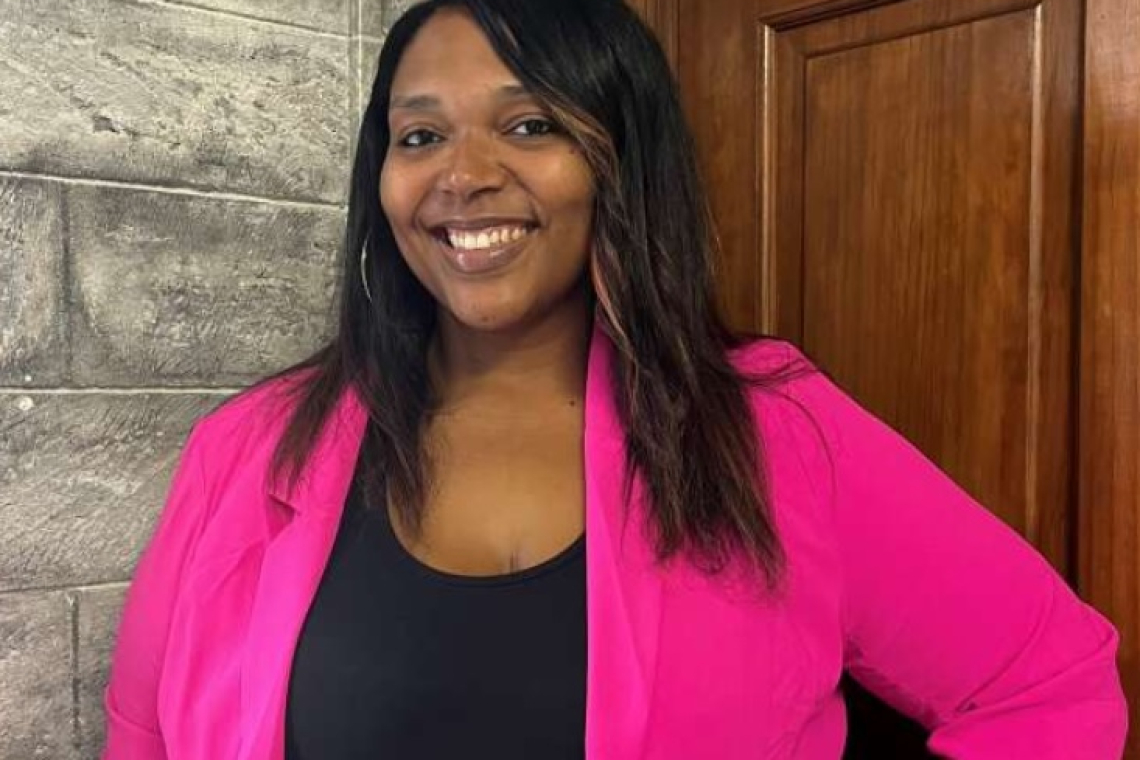Executive Director of the Women’s Resource Centre Juanae Crockwell.
HAMILTON, Bermuda--Bermuda’s abortion rules have been branded “unconstitutional and outdated” by a women’s rights organisation, which said the island faced a “critical opportunity” to treat the procedure as a human rights issue.
The Women’s Resource Centre (WRC) threw its support behind a call that came last week from a government senator for a review of the island’s restrictions on a woman’s right to decide whether to terminate a pregnancy.
The WRC said it stood in “full support” of Arianna Hodgson’s remarks last Wednesday in the Upper House, and called for “urgent discourse on abortion rights”.
Hodgson, who was backed by two other women senators, spoke during the motion to adjourn. She told of her shock after a couple who sought to end a pregnancy had their decision overturned by a legally mandated medical group, the Therapeutic Abortion Committee.
The junior minister for labour, finance and health told the senate she had been contacted by a young woman the previous weekend who “didn’t know what to do” after her application got turned down.
“I immediately put on a few hats – concerned friend, concerned mother and, immediately after that, I became the concerned legislator.”
The WRC applauded the senator’s stand, in which Hodgson said that Bermudians should consider “whether we would like to see our government advance legislative amendments that will preserve a woman’s right to choose”.
The WRC stated at the weekend: “We commend senator Hodgson for her courage in confronting a topic that is both divisive and crucial for women’s health and rights.”
The charity expressed “deep concern that in 2024, systemic barriers continue to prevent women in Bermuda from exercising their fundamental right to make decisions about their bodies and futures”.
The WRC noted that Hodgson’s comments lifted the lid on a topic seldom put to open debate in Bermuda.
“Abortion remains a sensitive subject in our community, but that sensitivity should not deter us as advocates and leaders from addressing this critical issue.”
Abortions are legal in Bermuda, but require the approval of a committee of “obstetricians, a psychiatrist and a general practitioner” according to the Bermuda Hospitals Board’s by-laws.
The publicity over the island’s regulations comes after the United States (US) Supreme Court’s overruling in 2022 of the landmark Roe v Wade decision, thus removing a constitutional right to abortion in Bermuda’s closest neighbour.
Abortion has since flared as a topic of protests across the US, and features in its presidential race.
Juanae Crockwell, the executive director of the WRC, said, “We are acutely aware of the challenges women in Bermuda face regarding access to abortions. Although current legislation allows for the procedure, requiring a woman to seek approval from a committee for a personal health decision is demeaning and fundamentally undermines gender equity.”
Crockwell added: “No equivalent legislation governs a man’s anatomy or his ability to access procedures that benefit his health. Moreover, the process to obtain an abortion is often inaccessible for low-income or uninsured women, highlighting another layer of healthcare inequity.”
The WRC said abortion had a history of getting framed as a moral or ethical issue. The organisation added that it was “imperative to view it for what it truly is – a matter of human rights and bodily autonomy”.
The WRC said women should be “empowered to make informed decisions about their own health and well-being without external interference or undue barriers”.
Crockwell said the “essence” of the WRC’s empowerment and prevention programmes for women meant giving them “the confidence, education and tools” to make healthy decisions and informed choices for themselves and their families.
“Denying women the right to make decisions about their own bodies fundamentally undermines that principle,” she added.
“While the topic may be sensitive, it is, at its core, simple: a woman must have the ability to make choices about her body, her future and her life. Stripping away that choice, in any circumstance, is deeply problematic.”
The WRC called it “a human rights and social justice issue that affects the entire community” and said denying the right to choose undermined principles of equality and justice “upon which our society is built”.
It called the island’s legislation on the issue “outdated” and in need of reform. The WRC said the use of a committee to assess applications mirrored a model introduced in Canada in 1968, but deemed unconstitutional by its Supreme Court in 1988.
“Yet, 36 years later, Bermuda continues to rely on this process, which – despite serving some women’s needs – is unconstitutional and outdated.”
The group highlighted that only 51 countries permitted the termination of pregnancy at a woman’s request and without requiring justification. Under the law, Bermuda’s committee considers factors including incest, sexual assault and health risks.
The WRC said 22 countries allowed abortion based on social or economic circumstances, while 11 countries permitted it in cases where the pregnant woman had intellectual or cognitive disabilities.
“As Bermuda grapples with its own laws and policies on this issue, we are presented with a critical opportunity to determine where we stand on women’s rights and bodily autonomy.”
It said women facing unplanned pregnancies confronted issues of mental and physical health, financial stability, career aspirations and personal relationships. The WRC called for abortion policy to “respect individual circumstances and prioritise human rights”.
Crockwell said the WRC took no position on the morality of abortion, but stood “firmly on the necessity of a woman’s right to choose”.
“Unfortunately, women in Bermuda still do not fully possess that right, and that is a reality we must address.”
She encouraged “open, honest dialogue that leads to progressive change, ensuring that every woman in Bermuda has the right to make decisions that directly affect her health, body and future, advocating for women’s autonomy over their bodies, access to comprehensive healthcare and robust support systems”. ~ The Royal Gazette ~







